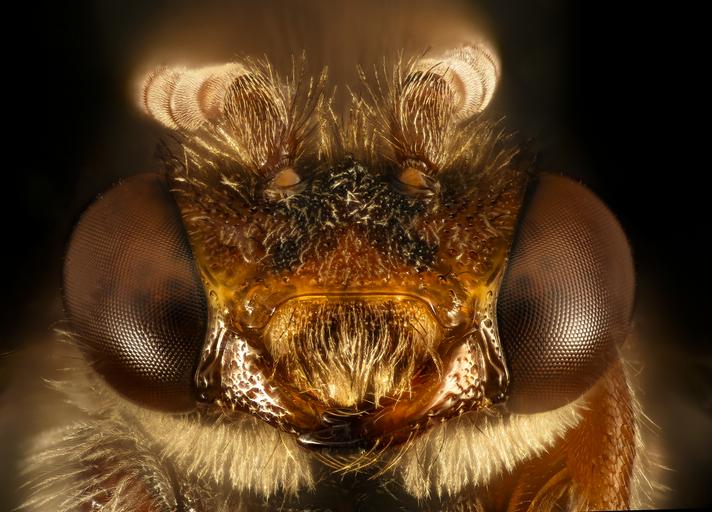MAKE A MEME
View Large Image

| View Original: | Nomada_Bidentate_Group,_Face_2016-06-27-15.34.jpg (4530x3256) | |||
| Download: | Original | Medium | Small | Thumb |
| Courtesy of: | www.flickr.com | More Like This | ||
| Keywords: zerene stacker zerenestacker department of the interior departmentoftheinterior droege bee inventory and monitoring laboratory beeinventoryandmonitoringlaboratory patuxent wildlife research center patuxentwildliferesearchcenter taxonomy:genus=nomada indoor The genus Nomada includes many species with murky taxonomies. The group of species with an extra tooth off the tip (we call them the bidentate group) are particularly tricky with molecular working showing it to be a swarm of many "species". So it goes in insect land. Here is a bidentate specimen from Maryland, a female, you can see the bidentate tooth in the head shot. ~~~~~~~~~~{{{{{{0}}}}}}~~~~~~~~~~ All photographs are public domain, feel free to download and use as you wish. Photography Information: Canon Mark II 5D, Zerene Stacker, Stackshot Sled, 65mm Canon MP-E 1-5X macro lens, Twin Macro Flash in Styrofoam Cooler, F5.0, ISO 100, Shutter Speed 200 Beauty is truth, truth beauty - that is all Ye know on earth and all ye need to know " Ode on a Grecian Urn" John Keats You can also follow us on Instagram - account = USGSBIML Want some Useful Links to the Techniques We Use? Well now here you go Citizen: Art Photo Book: Bees: An Up-Close Look at Pollinators Around the World www.qbookshop.com/products/216627/9780760347386/Bees.html... Basic USGSBIML set up: www.youtube.com/watch?v=S-_yvIsucOY USGSBIML Photoshopping Technique: Note that we now have added using the burn tool at 50% opacity set to shadows to clean up the halos that bleed into the black background from "hot" color sections of the picture. www.youtube.com/watch?v=Bdmx_8zqvN4 PDF of Basic USGSBIML Photography Set Up: ftp://ftpext.usgs.gov/pub/er/md/laurel/Droege/How%20to%20Take%20MacroPhotographs%20of%20Insects%20BIML%20Lab2.pdf Google Hangout Demonstration of Techniques: plus.google.com/events/c5569losvskrv2nu606ltof8odo or www.youtube.com/watch?v=4c15neFttoU Excellent Technical Form on Stacking: www.photomacrography.net/ Contact information: Sam Droege sdroege@usgs.gov 301 497 5840 The genus Nomada includes many species with murky taxonomies. The group of species with an extra tooth off the tip (we call them the bidentate group) are particularly tricky with molecular working showing it to be a swarm of many "species". So it goes in insect land. Here is a bidentate specimen from Maryland, a female, you can see the bidentate tooth in the head shot. ~~~~~~~~~~{{{{{{0}}}}}}~~~~~~~~~~ All photographs are public domain, feel free to download and use as you wish. Photography Information: Canon Mark II 5D, Zerene Stacker, Stackshot Sled, 65mm Canon MP-E 1-5X macro lens, Twin Macro Flash in Styrofoam Cooler, F5.0, ISO 100, Shutter Speed 200 Beauty is truth, truth beauty - that is all Ye know on earth and all ye need to know " Ode on a Grecian Urn" John Keats You can also follow us on Instagram - account = USGSBIML Want some Useful Links to the Techniques We Use? Well now here you go Citizen: Art Photo Book: Bees: An Up-Close Look at Pollinators Around the World www.qbookshop.com/products/216627/9780760347386/Bees.html... Basic USGSBIML set up: www.youtube.com/watch?v=S-_yvIsucOY USGSBIML Photoshopping Technique: Note that we now have added using the burn tool at 50% opacity set to shadows to clean up the halos that bleed into the black background from "hot" color sections of the picture. www.youtube.com/watch?v=Bdmx_8zqvN4 PDF of Basic USGSBIML Photography Set Up: ftp://ftpext.usgs.gov/pub/er/md/laurel/Droege/How%20to%20Take%20MacroPhotographs%20of%20Insects%20BIML%20Lab2.pdf Google Hangout Demonstration of Techniques: plus.google.com/events/c5569losvskrv2nu606ltof8odo or www.youtube.com/watch?v=4c15neFttoU Excellent Technical Form on Stacking: www.photomacrography.net/ Contact information: Sam Droege sdroege@usgs.gov 301 497 5840 | ||||